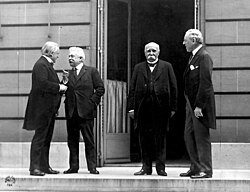Wikijunior:World War II/Before The War in Europe

Before World War II, Germany and France had been in conflict in Europe for almost 80 years, and had fought two large wars, the Franco-Prussian War and World War I (aka The Great War).
The "Treaty of Versailles" which had been drafted by the leaders of Britain (Lloyd George), France (Geroges Clemanceau), Italy (Vittoria Emanuale Orlando) and the United States (Woodrow Wilson), was harsh on Germany. The treaty left Germany with all of the blame for the war (despite the circumstances, and the fact that Austria-Hungary started the war). It also placed very tough rules about what the Germans could do. They had to give up land, could only have a very small army with no modern weapons like tanks, and had to pay an incredibly large fine called "reparations" to the winners of the war (the "Allied Powers"), that destroyed the country economy and produced unsupportable unemployment numbers.
Anger at the treaty in Germany grew, and was exploited by The National Socialist German Workers' Party, that was last led by Adolf Hitler in 1933, leading to the establishment of totalitarian regime known as the Third Reich.
Hitler spoke publicly demanding an end to the treaty. In the 1930s an economic crisis also added to German Dissatisfaction leading to Hitler's rise to power.
Meanwhile in Italy, Benito Mussolini had come to power, and was rapidly creating an Italian Empire.
The rise of both Germany and Italy, gave the former allies Britain and France grave concerns, given that the Great War had cost many lives. Britain did not want another catastrophic war, and felt under-prepared to fight one.
As a result of this Britain and France tried diplomatic solutions, although the League of Nations which had been established to resolve disputes between nations, proved in practice to be hopelessly ineffective.
Both Britain and France also attempted to conclude agreements with both Mussolini and Hitler, to prevent attacks. Additionally Britain, France and Poland concluded an alliance which agreed that if Germany or Italy attacked any of the three countries, the other two countries would attack Germany or Italy.
The Germans made an agreement, but they never planned to stick to it. Secretly they had made agreements with the Soviet Union that they would both attack Poland and never fight each other. Germany was also advancing a policy of reuniting the German speaking peoples, as well as recovering lands taken from it at World War I. They took over Sudetenland, part of Czechoslovakia, and Austria.
German preparation
[edit | edit source]Since World War I, the Germans had learned many lessons. One very important idea they had was about how to use tanks. In World War I, tanks were a new idea and had been used to work with infantry (soldiers fighting on foot). This meant the tanks moved slowly and were heavily armoured to protect the soldiers against enemy guns. The Germans new idea was for tanks to work only with soldiers carried in lorries, usually armoured ones. This meant the tanks could advance much quicker. The Germans planned to smash through enemy defenses then dash forward in their tanks for miles until they had cut off the enemy from any support. Then the infantry could capture the cut off soldiers. This new idea was very advanced and would lead to all of the German success at the beginning of the war.
